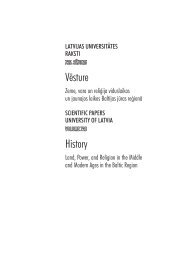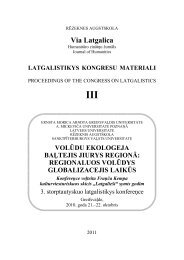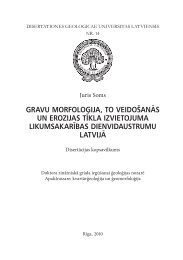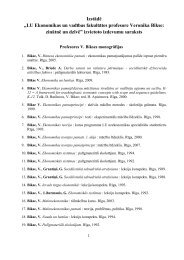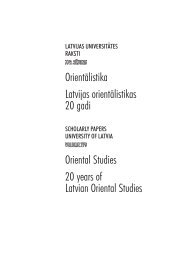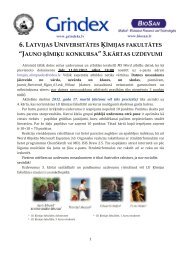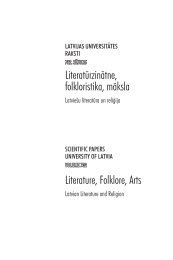Untitled
Untitled
Untitled
You also want an ePaper? Increase the reach of your titles
YUMPU automatically turns print PDFs into web optimized ePapers that Google loves.
Sigma Ankrava. Pçckoloniâlais sindroms un identitâtes krîze Latvijâ<br />
victory and to say that not every detail in this victory was good. And<br />
the major bad thing in the victory of the USSR was the complete disregard<br />
of a human life. 8<br />
To prove his point the author examplifies it with the fact that among all the war<br />
films created by the Russian cinema there is not a single one resembling in its ideology<br />
the American movie “Saving Private Ryan” in its basic assumptions. Russian war<br />
films are based on a completely different ideology which is still ruling in that part of<br />
the world. A. Shabanov touches on the problem of Latvians who were affected by<br />
the Soviet totalitarian regime and retained many features of it. And here he delicately<br />
does not go any further, saying that he is not an ethnic Latvian. As I am an ethnic<br />
Latvian myself, I have tried to pursue this topic.<br />
Contemporary Latvians should be aware of the strong and week weak spots of<br />
their identity. To their “weak spots” I would attribute the fact that their identity got<br />
strongly deformed under the Soviet regime: a degradation of virtues, especially the<br />
virtue of diligence, is undeniable. Latvians are often outwardly reticent about their<br />
ethnicity, or –they are haughty, as if being a Latvian is it their own achievement, or<br />
merit. At the same time they pollute their language with the slang that arrived along<br />
with the Soviet occupation. V. Zariòð, who has gone deeper into this topic, writes:<br />
One of the drawbacks that has formed itself in the character of the<br />
Latvian nation as the result of extended lasting foreign rule is the lack of<br />
refinement so often found among the wealthy and ruling elite of Latvia.<br />
Those layers of Latvian society which might have reached and maintained<br />
high standards of education, professional qualification and culture,<br />
and which were independent enough as to their material well–being as<br />
well as to their spiritual development in order to maintain the sovereignty<br />
of their judgement, simply could not emerge during the long years of<br />
dependency. They were assimilated or destroyed already in their embryonic<br />
stage. That is why Latvians have not produced the spiritual aristocracy<br />
and the social elite that would have acquired the tradition of high<br />
culture. Latvians often have bad manners and unrefined taste. They often<br />
offer little resistance to alcoholism, drug addiction and other social<br />
vices, and there is a lot of inertness and a general lack of initiative. To<br />
their weaknesses one should also attribute the slow emancipation of their<br />
conscience which is a result of being a minority and a subjected nation<br />
and insufficient determination to fight for their own interests.<br />
In some of the people who belong to the ruling elite of Latvia one can<br />
find the thinking of a lackey being developed in the long period of dependency<br />
– it is a desire to gratify hostile foreign powers and get satisfaction<br />
from demonstrating an upstart’s attitude to the world i.e. desire<br />
for luxury cars, pretentious private houses, debauchery, carousal and lavish<br />
trips. Tthough it is not something typical to Latvia and to the Latvian<br />
nation exclusively. Imitation of the lifestyle of the ruling elite of other<br />
nations in the behavior of the Latvian parvenus is as common as in the<br />
33



